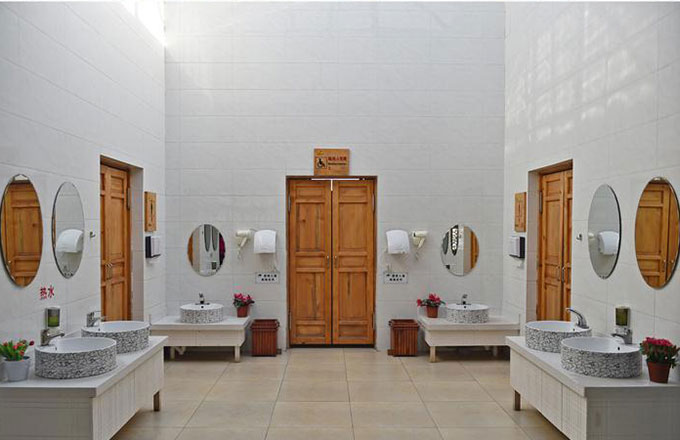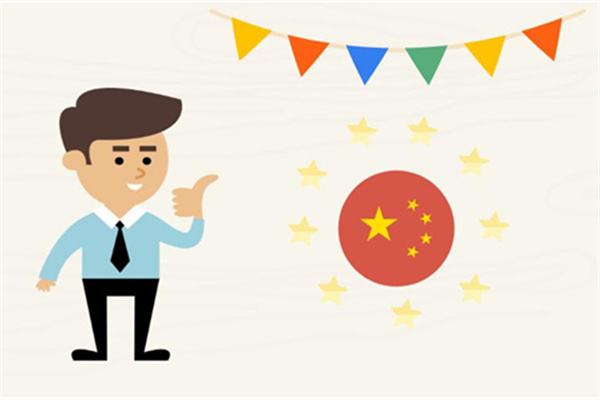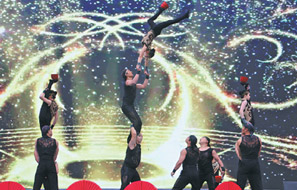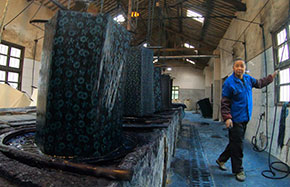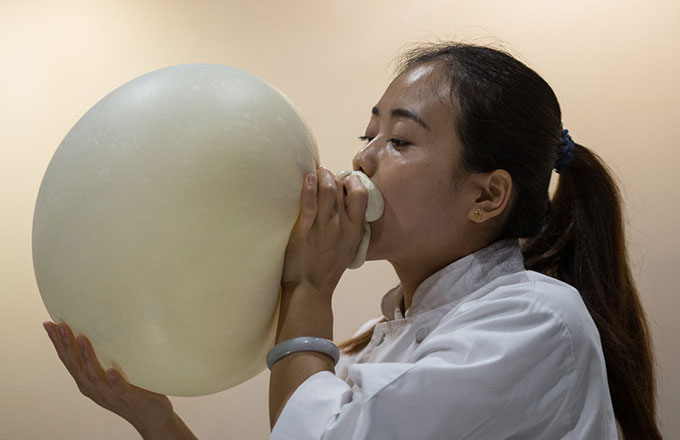Acrobats inject life into folk art
Innovative ideas help keep traditional culture fresh for new audiences
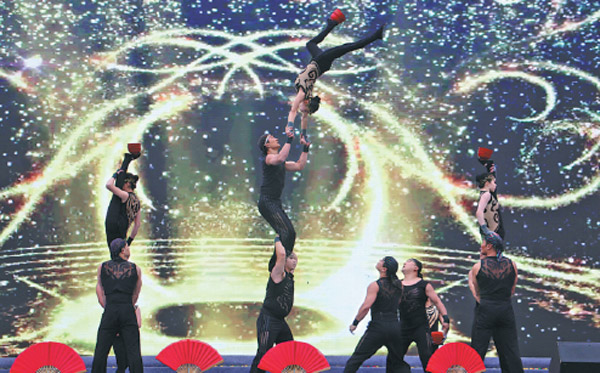 |
|
Acrobats perform during an acrobatics festival in Linquan county, Anhui province, on Nov 18. The festival attracted 70 troupes from all over the country. [Photo by Lu Qijian/For China Daily] |
Born in a county where more than 20,000 people are skilled acrobats, Yin Bo has spent most of his life performing around the country.
Yin, 47, returned to Linquan county, Anhui province, recently from Guangzhou in Guangdong province for a weeklong acrobatics festival.
Instead of a traditional performance, Yin introduced a new program combining acrobatics with magic, telling the story of a magician who is put under a spell by a wizard and forced to torture his lover before he is able to free himself and take his revenge.
"The acrobatics industry has changed a lot in the past three decades, during which I have made great efforts to keep the business running," said Yin, deputy head of the Feiyang Acrobatics Troupe.
Yin and his sister, who heads up the troupe, inherited it from their father Yin Yanchun.
With more than 60 members, mostly based in Guangzhou, the troupe has seen annual earnings exceed 2 million yuan ($304,190) in the past few years, according to Yin Bo.
Linquan's cultural authorities said the county has over 1,200 troupes and more than 20,000 acrobats, with most touring the country for business.
"The local market is too small to support all those acrobats," said Yin Bo, adding that Linquan enjoys nearly 2,000 years of acrobatic history and is recognized as the home of this kind of folk art.
Linquan, home to more than 2.3 million people, is China's largest county in terms of population as well as one of its most underdeveloped areas.
"As acrobatics is painstaking and dangerous, performers are mostly from poverty stricken families," said Yin Yanchun, 70, who was from such a family and started to learn acrobatics when he was only 10 years old.
"Performers should start to practice acrobatics between 8 and 15," said the elderly acrobat, who started teaching his son before he reached 15 and then sent him to join a Shanghai acrobatics troupe.
In Shanghai, Yin Bo also attended years of horse-riding courses, which later allowed him to develop programs combining his equestrian and acrobatic skills.
In 1978, when China's reform and opening-up began, Yin Yanchun established his own troupe in Linquan and achieved "huge success".
"Local people at that time had few options for entertainment, but watching acrobatics shows, which were cheap, was really exciting," he said.
His troupe just needed to pitch a tent in a city square or village and people would flock to it, he added.
This business model came under threat in around 2000, when China's urban administration authorities started to curb street tents amid public security concerns and in a bid to tidy up city centers.
Yin Yanchun said the best troupes were mostly State-owned, while his was one of the best private ones.
The father and son are both members of the China Acrobats Association, whose members are mostly from State-owned troupes.
"We were the only two members from private troupes," he said.
The Yins' troupe moved to Guangzhou in 1996, as they thought they would do better business in the metropolis. Many other troupes also left Linquan.
Around 2000, the troupe started to shift to performing at corporate and government events. "Companies and governments held gala shows and we were invited to perform," Yin Bo said.
Government engagements increased steadily until 2012, when the Communist Party of China released an "eight-point" rule on austerity as part of efforts to clamp down on corruption.
"Local governments don't tend to hold gala shows and festivals, which were once a popular part of official investment and tourism strategies," Yin Bo said.
Today, most of the troupe's business comes from real estate developers, although it still relies on local governments, which are attaching increasing importance to protecting local culture and folk arts.
"The governments fund us and send us to perform for local people in public and free shows instead of exclusive ones," said Yin Bo, whose weeklong performance in Linquan ended last month.







